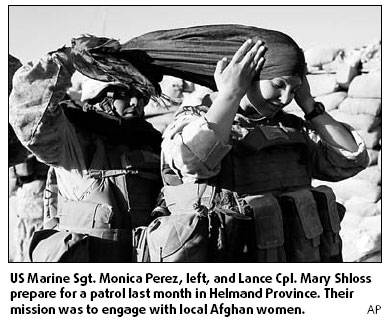
|
WORLD> Asia-Pacific
 |
|
Afghanistan exit seen worsening risks to Central Asia, the West
(China Daily)
Updated: 2009-09-15 15:31
 GENEVA: Premature Western military disengagement from Afghanistan would risk catastrophic turmoil in the region, Western and Afghan officials say, responding to a rising tide of concern at the intensity of insurgent violence.
Such greater instability would end up requiring an even bigger Western involvement to resolve in an area including nuclear-armed Pakistan and Al-Qaida's main bastions, they say. The officials argue there is no substitute for a lasting commitment now that would permit a reduced military presence over time as the country stabilizes. Public support fluid With insurgent violence at its highest since the Taliban movement was ousted from power in late 2001, public support for the war is declining in America and has plummeted in Europe. Former British High Commissioner in Pakistan Hilary Synnott, speaking at a weekend meeting of strategists in Geneva, said critics of Western strategy had to consider "the very great consequences of perceived American defeat". "There is real concern about Pakistan, with five times the population of Afghanistan, which has nuclear weapons and which has a new Pakistani Taliban threatening the state itself," he said. "Those who argue, as some do, that the smart thing is simply to walk away would destroy everything that has been achieved," Sherard Cowper-Coles, a British special representative for Afghanistan and Pakistan, told delegates. Power vaccuum Mohammad Masoom Stanekzai, advisor to President Hamid Karzai for home security and reconciliation, said the cost of a pullout "will be way higher than what you are spending right now." A hasty withdrawal would be the "same mistake" as when Washington disengaged from the region in the 1990s after the Soviet withdrawal. Then, the resultant power vacuum allowed Osama bin Laden's Al-Qaida and other militant groups to consolidate their presence on the mountainous Afghanistan-Pakistan border region. Almost all NATO nations have been reluctant to send more troops to Afghanistan so any significant rise will have to come from the United States. President Barack Obama is expected to approve a further increase of troop levels of some sort. Some analysts say a rapid pullout would lead to a resurgent Taliban which could quickly retake Kabul. A civil war would ensue, with neighboring countries backing rival local forces. The situation would have returned broadly to that of the 1990s, they say, but the Taliban would now enjoy the prestige of being seen as the force that defeated the Americans. It might seek to extend its writ across swathes of Pakistan. Afghans did not want "a new dark age", said Cowper-Coles. "We need an unshakeable long-term commitment to financing, training and mentoring the Afghan state, but that is very different from having our combat troops in action in the villages and valleys of the Pashtun belt indefinitely." As for US resolve, a former senior US intelligence official said there was no sign Obama was about to "wobble". "The president knows that whatever investment he has made is for the long term," the official said. Some may be reading 'wobble' when in fact he just needs more time to evaluate options and courses of action." Reuters |